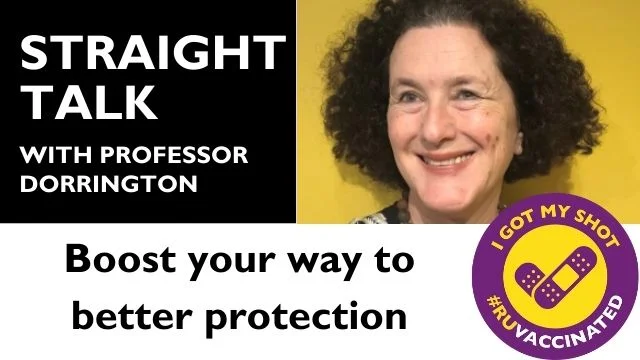
With the fifth COVID-19 infection wave now upon us, there is no better time to get your vaccine booster. But what is a booster? And why do you need it?
We asked Professor Rosemary Dorrington, virologist at Rhodes University and member of the Provincial COVID-19 Expert Panel, all the essential questions about boosters.
Q: What is a booster vaccination?
A: Currently, a single J&J dose or two Pfizer doses are required to be fully vaccinated. An additional booster vaccine dose (second J&J or 3rd Pfizer) can be taken that increases protection against infection.
Q: If I decide to get a booster, do I need to take the same type of vaccine?
A: Since 23 February 2022, South Africans have been allowed to mix and match the Pfizer and J&J vaccines. Heterologous booster doses refer to boosters of a different vaccine than that which was administered as the primary dose, while homologous refers to the same booster vaccine as the primary dose. In deciding which vaccine to administer as a booster, vaccine availability should be taken into consideration. According to the National Department of Health, if both vaccines are available at the vaccination site, homologous boosting should be preferred unless the vaccinee requests to receive a heterologous or different booster dose or has a history of experiencing an adverse event following immunisation.
Q: What is the point of getting a booster if I am already fully vaccinated?
A: The booster vaccination increases neutralising antibody levels and T-cell responses to SARS-CoV-2. According to laboratory tests, high neutralising antibody levels are more effective in preventing infection by existing variants of SARS-CoV-2. In addition, booster vaccines can help improve protection against infection.
Q: Doesn't getting a booster mean the vaccines are not effective?
A: No, being fully vaccinated is still highly (up to 95%) effective at preventing severe disease, hospitalisation and death. They also reduce onward transmission of infections – a vaccinated person is less likely to infect people around them, especially if they are also vaccinated. In addition, the scientific data now shows that being fully vaccinated prevents the onset of long COVID if you get infected. A booster vaccine provides increased protection (from 35% to 75%) against infection by omicron and its subvariants.
The concept of booster vaccines is not unique to COVID-19. After influenza vaccines first became widely available in the 1940s, booster jabs tailored to the circulating new flu strains are available each year before the winter flu season and provide protection for about six months. These booster jabs do not entirely prevent infection, but they effectively prevent severe illness.
Q: Will we have to continue getting boosters every six months indefinitely?
A: We don't know yet, but it is likely that we may have to take boosters on an annual basis – similar to the flu shot. This would depend on the emergence of new variants, which is something that we cannot currently predict. However, as more and more people get vaccinated and boosted, we can expect a decrease in the number and severity of infections.
Q: I've heard that the side effects of the booster are very intense. Is this true?
A: The side effects of booster vaccines are similar to the side effects of initial vaccine dose(s). Common side effects include tiredness, body aches and pains, low-grade fever, and pain at the injection site. These side effects resolve within 24-48 hours.
Q: Who is eligible for boosters?
A: According to the latest National Department of Health statement, all individuals older than 18 who have received one dose of the J&J vaccine are eligible to receive a booster dose of the same vaccine or a booster dose of the Pfizer vaccine after an interval of 60 days.
Individuals over the age of 18 years who have received two doses of the Pfizer vaccine are eligible to receive a booster dose of the same vaccine or a booster dose of the J&J vaccine at least 90 days after the second dose.
Further reading:
Please see the latest data on positive COVID-19 cases in hospitals (vaccinated vs unvaccinated) from the Department of Health vaccine dashboard at:

